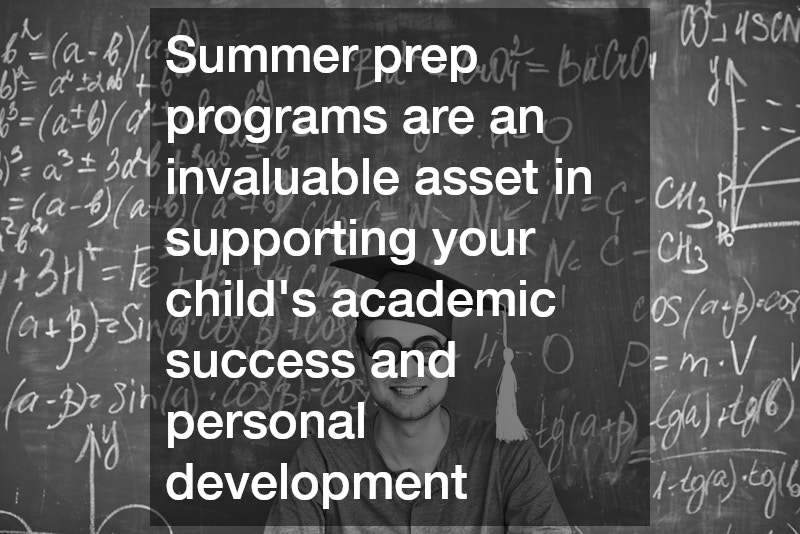Summer preparation programs have become increasingly important for children’s academic growth and development. These programs offer an opportunity for students to reinforce existing skills, learn new concepts, and cultivate a love for learning that extends beyond the traditional academic calendar. By participating in a structured summer program, students can maintain, enhance, and even accelerate their learning progress, thereby setting a solid foundation for the upcoming school year.
In this article, we will explore various aspects of summer prep programs, including their definition, academic benefits, affordability considerations, selection criteria, and long-term impacts. By understanding these key components, parents and guardians can make informed decisions that contribute positively to their child’s educational journey. Ultimately, enrolling your child in a summer prep program could be one of the most impactful decisions you make to support their academic success and overall development.
What are Summer Prep Programs?
Summer prep programs are structured educational initiatives designed to help students bridge the gap between academic terms. These programs vary in length, focus, and intensity, but they share the common goal of keeping students engaged in learning during the summer months. They often include a combination of academic instruction, enrichment activities, and skill-building exercises to foster comprehensive development.
The curriculum of summer prep programs is usually tailored to meet the needs of different age groups and educational levels, from elementary through high school. Some programs emphasize core subjects such as math, science, and language arts, while others offer specialized topics like coding, creative writing, or foreign languages. The diversity in offerings allows parents to choose a program that aligns with their child’s interests and learning requirements.
How Do Summer Prep Programs Benefit Students Academically?
One of the primary academic benefits of summer prep programs is their ability to combat “summer slide,” a term used to describe the learning loss that can occur during extended breaks from school. Research shows that students can lose up to two months’ worth of math skills over the summer, a gap that these programs aim to prevent. By maintaining a regular academic routine, students can reinforce previously learned concepts and enter the new school year without the need for extensive review.
These programs also provide an opportunity for students to explore subjects in greater depth or tackle new areas of interest. For instance, a student who struggled with math during the school year might benefit from focused instruction to improve their skills over the summer. Alternatively, a student with a passion for science might engage in hands-on experiments, enhancing their understanding and excitement about the subject.
Are Summer Prep Programs Affordable?
Affordability is a key consideration for parents when deciding whether to enroll their children in summer prep programs. Fortunately, there is a wide range of programs available at various price points, making it possible for families to find an option that fits their budget. Many public schools offer free or low-cost summer programs funded by government grants or community organizations.
For those seeking specialized or more intensive programs, private organizations often provide scholarships or financial aid to help offset the costs. It’s important for parents to research these options and inquire about any available discounts, early registration fees, or sibling reductions. Investing in a summer prep program can be seen as a valuable contribution to a child’s future academic success and overall development.
How to Choose the Right Summer Prep Program?
Selecting the right summer prep program for your child can be a challenging task, given the plethora of options available. One of the first steps is to assess your child’s educational needs, interests, and learning style. Understanding these aspects can guide you in choosing a program that not only addresses their academic weaknesses but also nurtures their passions.
It is also important to consider the program’s curriculum and teaching methodology to ensure they align with your educational goals for your child. Look for programs that offer a balanced mix of academic knowledge and practical skills, promoted through engaging and interactive learning experiences. Additionally, reading reviews or seeking recommendations from other parents can provide valuable insights into the program’s quality and effectiveness.
What are the Long-term Benefits of Summer Prep Programs?
Participating in summer prep programs can yield numerous long-term benefits that extend well beyond the immediate school year. For starters, these programs help cultivate a growth mindset, encouraging students to view challenges as opportunities for growth rather than obstacles. This perspective is crucial for lifelong learning and adapting to an ever-changing world.
Additionally, the skills acquired during summer prep programs, such as time management, organization, and critical thinking, are essential for success both inside and outside the classroom. By developing these skills early on, students are better equipped to handle the increasing demands of higher education and future careers. Moreover, the social and collaborative aspects of these programs help students build interpersonal skills and establish friendships that contribute to a supportive learning environment.
Conclusion
In summary, summer prep programs are an invaluable asset in supporting your child’s academic success and personal development. By providing a structured and engaging learning environment, these programs help prevent learning loss, boost academic performance, and instill a passion for lifelong learning. Through careful selection and commitment to these programs, parents can make a significant positive impact on their child’s future academic journey.
.




